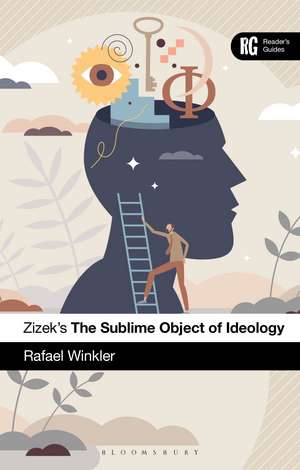Zizek's The Sublime Object of Ideology: A Reader’s Guide: Reader's Guides
Autor Rafael Winkleren Limba Engleză Paperback – 26 iun 2024
| Toate formatele și edițiile | Preț | Express |
|---|---|---|
| Paperback (1) | 132.80 lei 3-5 săpt. | |
| Bloomsbury Publishing – 26 iun 2024 | 132.80 lei 3-5 săpt. | |
| Hardback (1) | 405.79 lei 6-8 săpt. | |
| Bloomsbury Publishing – 26 iun 2024 | 405.79 lei 6-8 săpt. |
Din seria Reader's Guides
- 5%
 Preț: 164.90 lei
Preț: 164.90 lei -
 Preț: 157.75 lei
Preț: 157.75 lei - 22%
 Preț: 566.78 lei
Preț: 566.78 lei - 19%
 Preț: 496.21 lei
Preț: 496.21 lei - 14%
 Preț: 143.87 lei
Preț: 143.87 lei - 9%
 Preț: 143.41 lei
Preț: 143.41 lei -
 Preț: 147.76 lei
Preț: 147.76 lei - 9%
 Preț: 157.32 lei
Preț: 157.32 lei - 14%
 Preț: 164.13 lei
Preț: 164.13 lei - 14%
 Preț: 165.20 lei
Preț: 165.20 lei - 14%
 Preț: 162.79 lei
Preț: 162.79 lei - 9%
 Preț: 143.87 lei
Preț: 143.87 lei - 8%
 Preț: 158.82 lei
Preț: 158.82 lei - 8%
 Preț: 151.03 lei
Preț: 151.03 lei - 14%
 Preț: 596.23 lei
Preț: 596.23 lei -
 Preț: 164.35 lei
Preț: 164.35 lei -
 Preț: 146.75 lei
Preț: 146.75 lei - 26%
 Preț: 494.94 lei
Preț: 494.94 lei - 8%
 Preț: 158.20 lei
Preț: 158.20 lei - 9%
 Preț: 144.12 lei
Preț: 144.12 lei - 14%
 Preț: 143.66 lei
Preț: 143.66 lei - 14%
 Preț: 176.61 lei
Preț: 176.61 lei -
 Preț: 144.04 lei
Preț: 144.04 lei - 9%
 Preț: 150.33 lei
Preț: 150.33 lei - 14%
 Preț: 143.78 lei
Preț: 143.78 lei -
 Preț: 176.61 lei
Preț: 176.61 lei - 9%
 Preț: 150.77 lei
Preț: 150.77 lei - 14%
 Preț: 151.84 lei
Preț: 151.84 lei - 14%
 Preț: 158.01 lei
Preț: 158.01 lei - 14%
 Preț: 144.04 lei
Preț: 144.04 lei - 20%
 Preț: 175.44 lei
Preț: 175.44 lei - 14%
 Preț: 143.41 lei
Preț: 143.41 lei - 14%
 Preț: 711.26 lei
Preț: 711.26 lei - 22%
 Preț: 595.82 lei
Preț: 595.82 lei -
 Preț: 215.25 lei
Preț: 215.25 lei - 24%
 Preț: 344.07 lei
Preț: 344.07 lei - 14%
 Preț: 151.13 lei
Preț: 151.13 lei - 22%
 Preț: 713.14 lei
Preț: 713.14 lei - 14%
 Preț: 151.21 lei
Preț: 151.21 lei
Preț: 132.80 lei
Nou
Puncte Express: 199
Preț estimativ în valută:
25.42€ • 27.44$ • 21.31£
25.42€ • 27.44$ • 21.31£
Carte disponibilă
Livrare economică 29 martie-12 aprilie
Preluare comenzi: 021 569.72.76
Specificații
ISBN-13: 9781350425651
ISBN-10: 1350425656
Pagini: 192
Dimensiuni: 156 x 234 x 25 mm
Greutate: 0.28 kg
Editura: Bloomsbury Publishing
Colecția Bloomsbury Academic
Seria Reader's Guides
Locul publicării:London, United Kingdom
ISBN-10: 1350425656
Pagini: 192
Dimensiuni: 156 x 234 x 25 mm
Greutate: 0.28 kg
Editura: Bloomsbury Publishing
Colecția Bloomsbury Academic
Seria Reader's Guides
Locul publicării:London, United Kingdom
Caracteristici
Introduces and profiles all of the philosophers with whom Zizek wrestles, helping inexperienced readers to fully understand what he's arguing for and against
Notă biografică
Rafael Winkler is a Professor of Philosophy at the University of Johannesburg, South Africa. He is the author of Philosophy of Finitude (Bloomsbury, 2018) and editor of Phenomenology and Naturalism (2017) and Identity and Difference: Contemporary Debates on the Self (2016).
Cuprins
AcknowledgmentsAbbreviationsPart I: Context The Habermas-Foucault debate, and Althusser Laclau and Mouffe; Antagonism and the Real of the Drive Part II: Overview of Themes Part III: Reading of the text1.1 What is Money?1.2 Exchange; Alfred Sohn-Rethel1.3 Cynical consciousness; Peter Sloterdijk1.4 Belief and Ideology1.5 Althusser; Interpellation and Misrecognition1.6 Kant and the Law1.7 Disidentification Section 22.1 Retroactivity (Nachträglichkeit)2.2 Error as the Way to the Truth2.3 Desire and Lack2.4 Trauma redux2.5 The Form of Ideology Section 33.1 (a) The Constitution of Sublime Objects3.2 The Quilting Point; Laclau and Mouffe's Hegemonic Logic3.3 Descriptivism vs. Anti-descriptivism3.4 The Essence or 'je ne sais quoi' of the Object3.5 (b) The Constitution of the Subject and Enjoyment (Jouissance)3.6 Imaginary and Symbolic Identification3.7 'Che vuoi?'3.8 Fantasy3.9 The Real4.0 Ideology Revisited Section 44.1 Symbolic and Physical Existence; Symbolic and Physical Death4.2 Benjamin's 'Theses on the Philosophy of History'4.3 Power and its Representation Section 55.1 'There is No Metalanguage'; Derrida and Dissemination5.2 Lacan and 'Lenin in Warsaw'5.3 The Real Revisited5.4 Freedom and the Forced Choice; the Real5.5 Lack, the Subject, and the Ontological Inconsistency of the Big Other5.6 The Ideological Function of objet a5.7 The Subject Presumed to . Section 66.1 The Indefinite Judgment, Lack, and Negation6.2 Beauty and the Sublime; the Pleasure Principle and its Beyond6.3 From Kant to Hegel; Lack and Negativity6.4 'Spirit is a Bone'6.5 Hegel's Phenomenology of Spirit and the Heroism of Flattery6.6 The 'Beautiful Soul' and Positing the Presuppositions Part IV: Reception and influence
